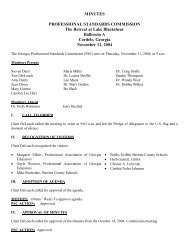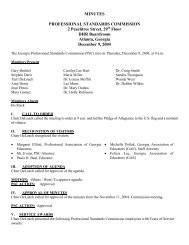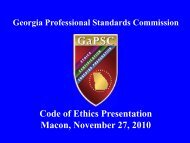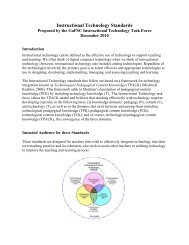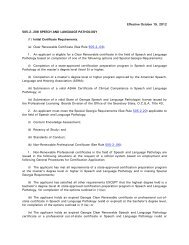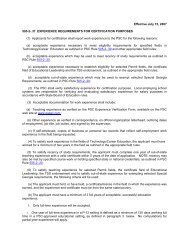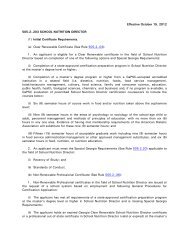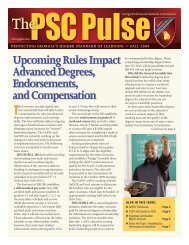PRS - GaPSC
PRS - GaPSC
PRS - GaPSC
Create successful ePaper yourself
Turn your PDF publications into a flip-book with our unique Google optimized e-Paper software.
Specialized Professional Associations (SPAs). The national organizations that represent teachers,<br />
professional education faculty, and other school personnel who teach specific subject matter (e.g.<br />
mathematics or social studies) or teach students at a specific developmental level (e.g. early childhood,<br />
elementary, middle level, or secondary), teach student with specific needs (e.g. bilingual education or<br />
special education), administer schools (e.g. principals, superintendents), or provide services to students<br />
(e.g. school psychologists, school counselors). Many of these associations are member organizations of<br />
NCATE and have standards for both students and candidates preparing to work in schools.<br />
Standards. Written expectations for meeting specified levels of performance.<br />
State Approval. Process through which the Georgia GAPSC affirms that professional education units<br />
and/or preparation programs meet standards of quality so that their completers will be eligible for state<br />
certification.<br />
State Protocol. Rules, procedures and expectations for NCATE, the <strong>GaPSC</strong>, and the professional<br />
education unit for conducting joint NCATE/<strong>GaPSC</strong> on-site professional education unit and preparation<br />
program approval reviews.<br />
Structured Field Experiences. Activities designed to introduce candidates to increasingly greater levels<br />
of responsibility in the roles for which they are preparing. These activities are specifically designed to<br />
help candidates attain identified knowledge, skills, and professional dispositions outlined in professional,<br />
state, and institutional standards.<br />
Student Teaching. Pre-service clinical practice in P-12 schools for candidates preparing to teach.<br />
Students. Children and youth attending P-12 schools, as distinguished from teacher candidates.<br />
Supervised Student Teaching. Practice teaching or internship in a P-12 school. Supervised student<br />
teaching is required by the state as a condition for completion of a teacher education program.<br />
Support Personnel. Individuals other than faculty employed by an institution of higher education to<br />
ensure the functioning of the professional education unit. Support personnel can include professionals in<br />
non-faculty roles as well as individuals providing administrative support, including work-study students.<br />
Technology Education. The study of technology, which provides an opportunity for students to learn<br />
about the processes and knowledge related to technology that are needed to solve problems and extend<br />
human capabilities.<br />
Technology, Use of. What candidates must know and understand about information technology in order<br />
to use it in working effectively with students and professional colleagues in (1) the delivery, development,<br />
prescription, and assessment of instruction; (2) problem solving; (3) school and classroom administration;<br />
(4) educational research; (5) electronic information access and exchange; and (6) personal and<br />
professional productivity.<br />
Test Code. The unique identification code assigned to each GACE assessment.<br />
Test Passers. The total number of all individuals whose test scores met or exceeded the minimum passing<br />
score for the specified GACE Assessments.<br />
Test Takers. The total number of all individuals who took the specified GACE assessment.<br />
54



